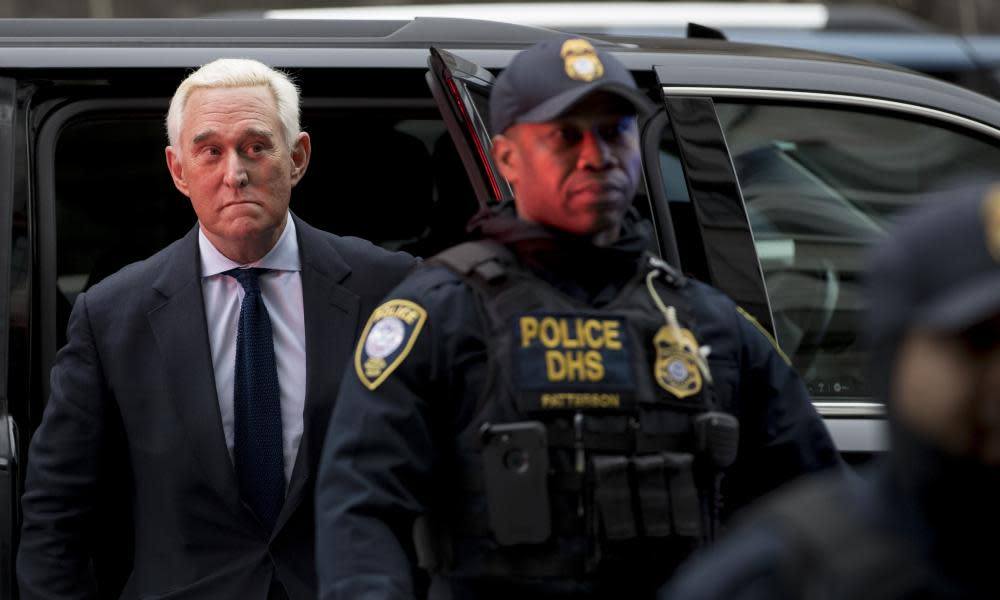William Barr's efforts to protect Roger Stone are another blow to rule of law

No one has ever accused the US attorney general, William Barr, of being soft on crime. Just last year, he gave a speech in which he blasted progressive district attorneys who “style themselves as ‘social justice’ reformers” and then “spend their time undercutting the police, letting criminals off the hook, and refusing to enforce the law”. When these prosecutors do bring charges, he complained, they seek “pathetically lenient sentences”. Barr’s message was clear: the integrity of the criminal justice system had to be protected at all costs.
Given Barr’s track record of fulmination against weak prosecutors, it came as something as a surprise yesterday when he intervened in the case of longtime Trump associate Roger Stone. Stone – an attention-seeking Republican bit-player whose crimes against fashion alone warrant a heavy sentence – committed a series of felonies including obstruction of justice, witness tampering, and lying to Congress during the Mueller investigation. In turn, these crimes stemmed from Stone’s attempts to obfuscate his contact with WikiLeaks during the 2016 election.
The crimes which Stone has committed are precisely the sort which threaten the ability of the criminal justice system to operate smoothly and fairly. No investigation can proceed effectively when a witness has to worry about a message he has received telling him to “prepare to die”, which is just one example of the missives which Stone dispatched to another Mueller witness, Randy Credico, in an attempt to force his silence. Precisely because they interfere with the operation of criminal justice system, federal sentencing guidelines deal with crimes like threatening witnesses particularly harshly.
Rather too harshly, it turns out, for Bill Barr. On Tuesday, Barr directed the justice department to recommend that Stone be sentenced to “far less” than the seven to nine years behind bars which prosecutors had sought – and which would be the standard punishment in a case such as his. Four government lawyers who had prosecuted the case against Stone promptly resigned in protest, one leaving the department of justice altogether. Not since Richard Nixon’s Saturday Night Massacre has such a sordid public clash swept through the justice department.
What could motivate Barr’s monumental act of hypocrisy? The answer lies in his complete subservience to Donald Trump. Just hours before the change, Trump had slammed the original sentencing recommendation as “disgraceful” and “an insult to our country”. He also claimed an “absolute right” to interfere in justice department investigations, even those concerning his friends and associates such as Stone.
The extent to which Barr has bent his knee, and increasingly that of the justice department, to Trump is profoundly troubling. Attorneys general have almost always gone to great lengths to avoid even the appearance of political interference in ongoing investigations. For Barr to dance so openly to the tune of Donald Trump’s Twitter feed suggests that not only has he been deeply corrupted, but that he doesn’t care who knows it. His shamelessness puts him in league with the Republican senators who voted to acquit Donald Trump despite clear evidence that he had committed impeachable offences.
But Barr is more dangerous than any senator because he wields more power. If he continues to allow the department to become an instrument of the president’s will, then he can do grave damage to American democracy and the rule of law. Autocrats always seek to corrupt the criminal justice system in order to give themselves and their subordinates legal cover as they attempt to undermine democratic institutions and norms. Another Trump subordinate – Rudy Giuliani – is currently under federal investigation for his involvement in the president’s illegal scheme to sway the outcome of the 2020 election. We can have no confidence that Barr will allow this investigation to go where the facts lead it.
By seeking special treatment for the president’s cronies, Barr creates the impression that future lawbreakers will be able to get away with their crimes so long as they further the interests of the president. Given that the president himself cannot be indicted for a crime, the exposure of his associates and subordinates to legal jeopardy is a key check on the growth of tyranny. As soon as political favoritism begins to play a role in whether or not criminals are prosecuted, the rule of law – and democracy – cannot last.
Like so many Republicans, Barr has become so obsessed with the dangers which he believes are posed by the left – “‘social-justice’ reformers”, as he put it – that he has become willing to countenance any abuse engaged in by the right in order to maintain its power. As with the Republican senators who voted against impeachment, it seems to matter little to him that he is forced to sacrifice his supposed principles, his reputation, and the integrity and vitality of the institution with which he is entrusted in order to protect the venal, criminal occupant of the Oval Office. Unless he is stopped, further great harm awaits.
Andrew Gawthorpe is a historian of the United States at Leiden University

